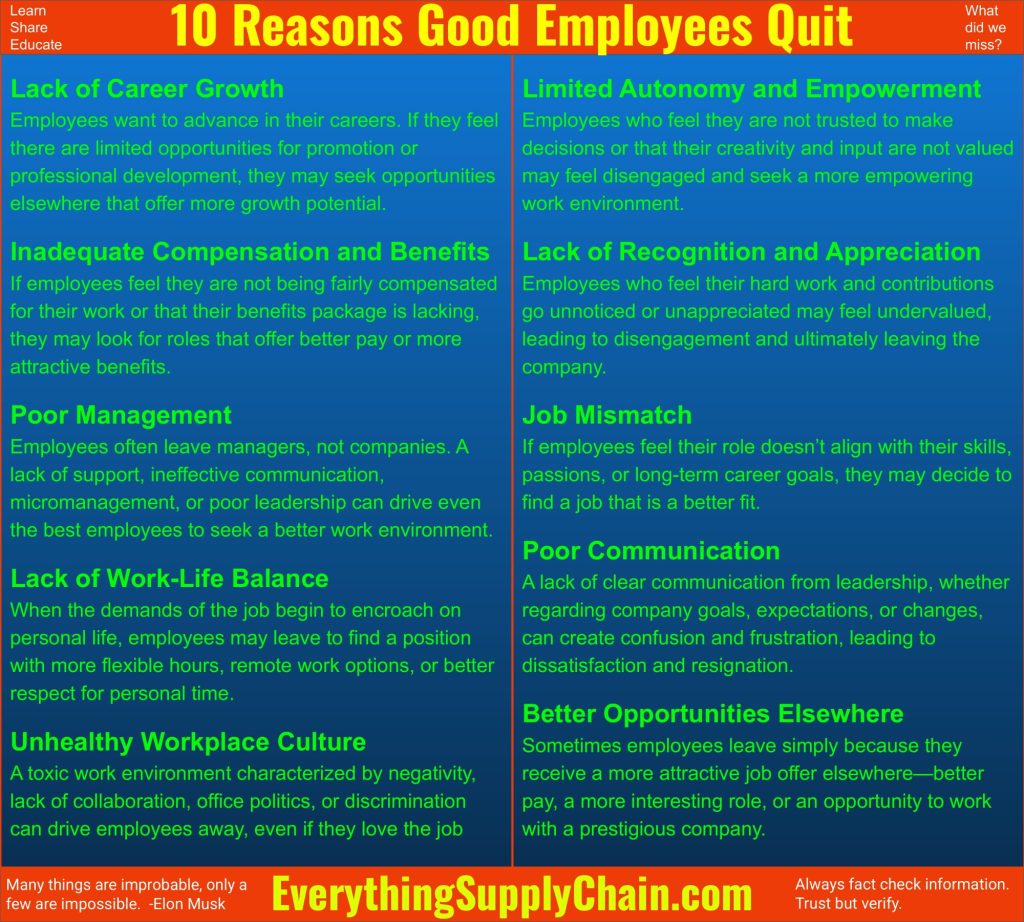10 Reasons Good Employees Quit and How to Fix.
Here are the top 10 reasons why good employees might choose to quit their job.

Further Details:
1. Lack of Career Growth
Why it matters: Employees are often motivated by the opportunity to advance their careers. If they feel stagnant in their role with little chance to acquire new skills or take on new challenges, they might leave in search of a more dynamic environment that offers career development.
How to address it: Companies can foster a culture of continuous learning by offering training, mentorship programs, clear career progression paths, and leadership opportunities. Regular performance reviews and open dialogues about career aspirations can help employees feel valued and motivated.
2. Inadequate Compensation and Benefits
Why it matters: Compensation is a major driver for employee satisfaction. If employees feel they are underpaid or that their benefits (health insurance, retirement contributions, paid time off, etc.) don’t meet their needs, they will often seek opportunities that offer more competitive packages.
How to address it: Employers should regularly benchmark their compensation packages against industry standards. They should ensure that raises and bonuses are tied to performance and are given in a timely manner. Offering comprehensive benefits such as flexible spending accounts, wellness programs, and stock options can also enhance overall employee satisfaction.
3. Poor Management
Why it matters: Employees often cite their direct manager as a key reason for leaving a job. Poor management can manifest in micromanagement, lack of trust, unclear expectations, or failure to support employees in achieving their goals. A toxic manager can lead to demotivation, burnout, and high turnover.
How to address it: Investing in leadership training and coaching for managers is essential. Companies should encourage managers to provide regular, constructive feedback, show empathy, and communicate openly. Ensuring that managers have the skills to lead effectively—through listening, mentoring, and empowering their teams—can significantly improve retention.
4. Lack of Work-Life Balance
Why it matters: When work demands spill over into personal time, employees may feel burnt out, stressed, or overwhelmed. Over time, this can erode their sense of well-being and happiness, which drives them to leave for a job that offers better work-life integration.
How to address it: Offering flexible working hours, remote work options, and the ability to manage work around personal commitments can help employees maintain a healthy balance. Encouraging employees to take time off and disconnect from work when needed can also support their mental health and well-being.
5. Unhealthy Workplace Culture
Why it matters: A toxic culture—characterized by office politics, gossip, bullying, or discrimination—can cause employees to feel unsupported, alienated, or demoralized. When employees don’t feel safe or respected, their desire to stay with the company diminishes.
How to address it: Companies should foster a positive, inclusive workplace culture where respect, transparency, and diversity are prioritized. Creating channels for employees to voice concerns safely (e.g., HR or anonymous feedback systems) and promoting teamwork over competition can help prevent toxicity from taking root. Clear policies against harassment and discrimination are also crucial.
6. Limited Autonomy and Empowerment
Why it matters: Micromanagement, or a lack of trust in employees’ decision-making abilities, can lead to frustration and a sense of disempowerment. Employees who feel their autonomy is stifled may become disengaged or frustrated, leading to higher turnover.
How to address it: Giving employees the freedom to make decisions within their role, offering them more control over how they complete their work, and encouraging innovation and creative problem-solving can improve job satisfaction. Providing opportunities for employees to take on projects that align with their strengths and interests helps them feel more involved and valued.
7. Lack of Recognition and Appreciation
Why it matters: Employees need to feel recognized for their contributions. When their hard work goes unnoticed, they may feel undervalued or that their efforts are taken for granted. This can lead to disengagement and eventually cause employees to leave for a workplace where their contributions are celebrated.
How to address it: Regularly acknowledge and appreciate employee achievements—whether through formal recognition programs, public praise, or simple thank-you notes. Incentivizing performance with awards, bonuses, or promotions can also reinforce the importance of their efforts.
8. Job Mismatch
Why it matters: Sometimes employees realize that their job is not aligned with their interests, skill sets, or long-term career goals. When they feel their talents are not being fully utilized, or that the work is no longer fulfilling, they may seek a role that better matches their ambitions.
How to address it: Regularly assess whether employees are in the right roles. Encourage open conversations about job satisfaction and growth. Provide opportunities for employees to transition to different roles within the company that align better with their skills or interests. This can improve job fit and reduce turnover.
9. Poor Communication
Why it matters: Employees need clear communication from leadership to understand their roles, the company’s goals, and any changes in the workplace. Without clear direction or feedback, employees can become frustrated, confused, or disillusioned with their work.
How to address it: Employers should prioritize transparent and open communication. Regular check-ins with employees, clear guidelines for projects, and fostering an environment where employees feel comfortable asking questions and offering suggestions can help mitigate this issue. Communication should be two-way, with employees feeling heard and understood.
10. Better Opportunities Elsewhere
Why it matters: Sometimes, employees leave simply because they receive a better offer elsewhere, whether in terms of salary, benefits, role, or company culture. The job market is competitive, and top talent is often in high demand. Employees may leave for opportunities they perceive as offering more personal or professional rewards.
How to address it: Companies can retain employees by staying competitive in the job market. This includes regularly reviewing compensation packages, offering growth opportunities, and creating an attractive work environment. Building strong relationships with employees, providing ongoing feedback, and being proactive about addressing any concerns can also prevent employees from seeking opportunities elsewhere.
Conclusion
Employee retention is a complex issue that often involves multiple factors. By understanding the underlying reasons why good employees leave and taking steps to address these concerns, companies can create a more supportive, engaging, and rewarding work environment. This not only improves retention rates but also leads to a more productive, loyal, and motivated workforce.
Reasons Employees Quit Quotes
- “The function of leadership is to produce more leaders, not more followers.” ~Ralph Nader
- “The future depends on what you do today.” ~Mahatma Gandhi
- “A good leader takes a little more than his share of the blame, a little less than his share of the credit.” ~Arnold H. Glasow
- “Leadership is not about being in charge. It’s about taking care of those in your charge.” ~Simon Sinek
- “True leadership stems from individuality that is honestly and sometimes imperfectly expressed… Leaders should strive for authenticity over perfection.” ~Sheryl Sandberg
- “Employees engage with employers and brands when they’re treated as humans worthy of respect.” ~Meghan M. Biro
- “Don’t be afraid to give up the good to go for the great.” ~John D. Rockefeller
- “The only way to do great work is to love what you do.” ~Steve Jobs
Career Development Resources
- Advice from TOP CEOs: Elon Musk, Jeff Bezos, Tim Cook.
- How to get Promoted (or a Raise) with these 10 Tips.
- How to Start a Conversation with Anyone.
- Negotiate Salary for Job Offer.
- 10 Steps to Better Decision Making.












